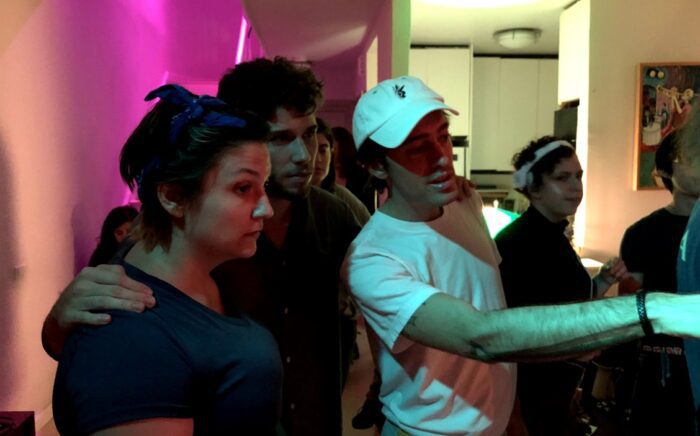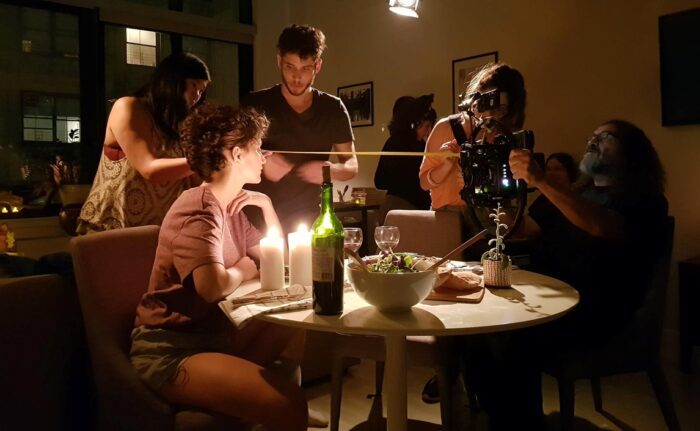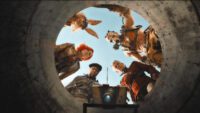With his first full feature Aligned, director-writer Apollo Bakopolous has struck a chord with a film that explores intimacy, self-discovery, love, and desire. Its two protagonists are both modern dancers whose career aspirations take them from Greece to New York and back again. With cinematography, editing, and music working in harmony to choreograph the dancers’ shared passion and performance, Aligned is a story of two young men finding love and purpose—though their quest to do so does not come easily.
Aeneas (Panagiotis Malakos), who lives in Hellas, is the film’s primary point-of-view character. Exuberant and talented but unsure of his self-worth, Aeneas finds in dance a measure of solace and direction. When another modern dancer, Alex (Dimitris Fritzelas), a Greek-American who has been living and studying in New York City, joins Aeneas’ troupe in Greece, soon sparks fly, both professionally and personally, between the two, in a transformative tale of self-fulfillment.
Bakopoulos is a New York based film director, producer, and screenwriter who has studied at the Eicar International Film School of Paris and the London Film Academy, before working in London and then New York as a cinematographer and director of short and promotional films; he is currently producing a documentary that explores topics of identity, equality and freedom of expression featuring Patricia Fields of Sex and the City. His work is focused on breaking psychological and artistic boundaries to empower individuals embrace their unique identities.
Bakopoulos recently took time to speak to Film Obsessive publisher J Paul Johnson about his film’s conception, production, and continuing exhibition. Scroll below the video for a transcript of the conversation, edited slightly for space and clarity.
Film Obsessive: Apollo, welcome. Where are you joining us from today?
Apollo Bakopoulos: Hi Paul, good to be here. Thank you for the invitation. Currently, I’m in beautiful Greece. It’s been about a month now, I’m visiting and I’m finishing up some work for my new project. I’m just enjoying the nice weather here and being cozy at my family’s place in Greece at this time.
Excellent. And your film Aligned? I know it premiered at the Brooklyn Film Festival last year, and it’s currently appearing in other festivals, is that correct?
Yes. We’re on the film circuit at the moment. We did our world premiere at the Brooklyn Film Festival this June, and we have been around a few festivals in the United States. We made our splash there, and we have more festivals coming up in the US. We just did our premiere in Canada last week, and we’re going to be doing our European premiere in the middle of March. We’re with a BFI festival in London. More screenings are coming up around the world and that’s exciting.
Will you be traveling with the film for some of those?
Yes, I will be traveling to Nebraska next month. Then I’m going to be in New York for a couple of weeks, and then I’m coming back to Greece to fly to London for our European premiere, which is going to be mid-March. Then I’m coming back to the US. We have a screening in Chicago and in Fargo.

Excellent. Why don’t I have you tell our viewers a little bit about Aligned in your own words. I’m just eager to hear how you would describe it yourself.
Yeah, Aligned is a reflection on self. Basically, it’s a film that invites you to see certain practices and way of thinking and way of being that can help you be more compassionate with yourself and also things that we can do. To have a discipline around the mind that has the tendency to beat us up and has a tendency to look at things more. It has a tendency negativity and security and fear. How we can have a discipline around that and compassionate at the same time. We can be more in the present moment and we can practice ways of being and principles that can make us more effective in life. The most important thing that when we’re in the moment and we’re not driven by fear or negative self talking, we can actually listen to what’s already there. Which for me, that very subtle voice which has to do with our inner guidance and our intuition. When we’re in tune with that, then we can feel more safe about the decisions we’re going to make. Things are more in alignment for us, this is deeper. What aligns about personal interconnection?
I understand and to hear you speak of it, the principles that you are aiming to put in practice with Aligned strike me as reasonably universal ones. So I’m wondering just how and when you sought the first inspiration for this, was it the message that really first came to you that you wanted to work through, and then you sought for a place, or a story line, or a character, Or were you thinking first in terms of your two protagonists, both of whom are professional aspiring dancers, and then working out situations for them?
It evolved. It started from an experience, a personal experience. I had a realization, something that made me learn more about myself at that time. It was the experience was very direct and profound for me that it helped me see what’s getting in my own way basically. In that time [it] was insecurity and fear and the need to seek for validation and love outside of myself. I had an experience that I saw that [made that] clear, that I was insecure and I wasn’t loving myself enough, and I was seeking that through other people. When it was coming more to the intimate level, I felt that I had work to do there. And I had an experience that really showed me what it means, what rejection means for me, what it means to want something that I can’t have, what kind of emotions it triggers in me.
And what I saw was triggering fear. And then I started digging more deeper into that, like why I would be upset if someone wasn’t behaving the way I want them to be. And why I would want someone else to validate me and make me feel that I’m lovable. Does that make sense? I had this kind of experience and then, and that’s what triggered me to start writing because I really saw that for the first time in my life. And that’s when I started the journey. And as I was digging, delving into the fears, I could see that there was a situation that I was afraid or something. And what that means like what is under that there was a fear under the fear that I would go and eventually I found myself that I could get to four, five, six, seven core fears that are universal and that’s what really driving the car for me.
So when I’m seeking to be loved by someone so I can feel better about myself, it means that I feel that I’m unlovable or I feel that I’m not good enough. And what that means, that means if I’m not good enough, I’m going to be unwanted and I’m going to be alone and things like that. You know what I’m saying? Those fears are universal. I was like if I’m going to focus on something, I’m actually going to focus on a fear that we can all relate to. And it’s actually the fear, it’s every daily fear that we all experiencing. And it’s underneath that if we dig in and what’s happening is that I’m seeking comfort from that fear eventually when I want to control a situation or another person’s behavior. If I’m not really afraid, then why would I want you to behave a certain way? Why would I be upset if you don’t give me what I want for myself? If I’m looking to be a certain way, it means that I’m trying to control something that I’m actually afraid of. Because if I wasn’t afraid, I wouldn’t be affected.
That’s what got me down to really each moment. What is it that it’s driving? Is it my fear or is it me trusting?
I understand. Or at least I think I understand! Your perspective is quite evolved on this and it sounds like you’ve had quite a bit of time to process that experience and those emotions. How long has Aligned been in the making? You were filming during Covid, correct? But the genesis for the film sounds like it goes back even further than that.
Yeah, it started a year before Covid. And during Covid, we had the opportunity to do post-production. So we didn’t film during Covid, we actually filmed before Covid. And then we did some extra filming after Covid. At both locations. Yeah, but during Covid it was an opportunity for post-production.
And I’m glad to hear, and it’s still distressing to talk with filmmakers whose production efforts were interrupted by Covid. Some of them were able to complete their projects, others not. You mentioned New York, and I’m interested also to hear about your own backstory a little bit. Now, you’re Greek, you’ve studied in Paris and London, it was in your adult years, I take it, that you came to New York, and I’m just wondering also how that figures as a site in opposition to Hellas in your film.
I had the calling to go to New York since I was a child. I was a little bit afraid of it in the beginning because I grew up in Greece, and when the time came to choose which location I want to start my international journey, living outside of Greece. It was scaring me a little bit in the beginning because it felt [so] far [away]. I did start my journey through Paris and London where I studied. And I also start working in London as a cinematographer. Back then when I graduated my film school, I stayed for three years and I did my practice.
But eventually the time came and I made the decision to go to New York and I arrived there. That was in 2010, early ’20s. At that time, it was the beginning of the journey of recreating myself and becoming the person that I am today. It was the best thing that I could do. Eventually, it was the most scary, but the most rewarding. And New York just feels more home than any other place that I live, anywhere else, even closer to Greece. For some reason, New York has been a place that I’ve been receiving a lot of inspiration. That’s why a lot of people go there. It’s just the energy there. It’s very high vibrational people who are very much in a creative mode and [willing] to show their best selves and challenge themselves and stress themselves and become the biggest versions [of themselves] that they can be. Because everybody is in the same mode.
It’s the nature of the city that makes you want to do things. It’s a very inspiring, it’s a beautiful city. I was always feeling that the beauty around me, so much creativity, we know it’s the city. It’s a hard place sometimes to live, but it also, it’s a beautiful place when we have a discipline around those practices that I mentioned in the beginning. And we can stay centered and we can discipline our mind and ourselves. And we can be in the flow of things happen very fast in New York. And that’s something that experienced all these years, for some reason just flowed for me there. I just felt that I could be myself. I felt that I could feel safe to be who I am as an LGBT person.
I grew up in Greece, and I had a completely different experience in Greece. I always felt that I don’t fit in. I wasn’t feeling very comfortable being gay in Greece. New York just gave me this opportunity to express myself and feel that I’m respected for who I am and to really explore my full potential as a human being. So it became home since then. I’m there, I travel a lot, and I come to Greece and back and forth and with Aligned, I spent a lot of time in Greece the last five years. But New York is home. And it’s that thing that there is a time that you need to get out of it and then when you’re out of it, you just miss it and you need to go back. Because it has something very specific that no other place has. It’s one of the ingredients that I need now. It’s home.

Your film has the two settings, of course, of Hellas and of New York, and the two characters: they’re both Greek, but one of them spends a fair amount of time in New York before bringing the other there. And your lead actors (Panagiotis Malakos and Dimitris Fritzelas), they’re both professional dancers with a lot of talent. And I’m wondering how you looked to cast them, if you were looking primarily for their abilities as dancers and then look to find ones who have the acting chops to do the dramatic scenes that you wanted to, or if it was perhaps the other way around.
Yeah, one of the things that I’ve been doing as a practice in New York all these years that I’ve lived there since 2010 is dancing. So I have used dancing as a way of meditation. It’s been one of my practices that helps me process emotions of the week. Or sometimes when I feel stuck, I go in and start moving and I’m feeling my emotions and it’s like a reset for me. So all these years I’ve been learning about practices and dancing and how to use the body and the effect that has on my body. Like how do I feel being in my body and how do I feel in relation with others? It’s a practice. It’s an experience that has helped me to ways of being when I’m dancing. I have to take it outside also in my everyday life and practice it in everyday life as well.
I knew that I was looking for dancers who understand principles because it’s contemporary dancing and also one of the dances that I have practiced. It doesn’t involve certain techniques like ballet. If you see in the film, it’s different, it’s more of a way of being with another person and their body. They don’t really touch it’s either. But you learn how to make space for yourself and the other person and go with the flow.. I wanted people that have experience in contemporary dancing and also people that they can meet the LGBT criteria. Also to find to people that the chemistry would work as well, they would understand about what principles we wanted to embody.
I have worked with dancers in the past and capturing the essence of that. We’re getting to a state, that letting go of the mind and we’re getting in a state of being the essence that comes in that moment. That’s what we capturing. You can have the experience when you watch it. That’s something that I have practiced.. It seemed like it worked. Eventually, with those two characters, we had our conversations, we became clear about what kind of principles we want other people to experience. What kind of relationship is that? Which was very much about innocence, playfulness, freedom and non-sexual intimacy. It was very important that they embody that. That’s how it worked.
We had our conversations first and we became clear of what is it that we’re creating, That’s how they were able to feel safe as well. That we can create a space where they can both feel vulnerable to show that more tender part of themselves in a safe space. We had rehearsals, we had moments that we worked together, we had moments that we worked, only the three of us, so we can all get used to each other and get comfortable and all of that. It was a journey because I was coming from that place. I was creating space for that. And that was also my commitment and my practice. And when I was clear with that internally, then they would also be this way as well, if that makes sense. We were all vibrating at the same. We just tuned in the same vibration.
It really does come across. The two leads both have a good deal of interpersonal energy as dancers, but also as human beings who are capable of being comfortably, platonically intimate with each other. But then also later, not to give away a major element of the plot, sexually intimate with each other as well. And there is a palpable energy to the film, both in that relationship and in the dance they perform.
They were touched by the story and I think they understood the importance of what’s missing generally from this community: the relationship between men. And it’s something that’s taking a, it took a long time to get where we are today because we had a culture and certain beliefs that didn’t really allow gay love to be in the middle of that. And the possibility for love and marriage and all of that. It’s something that it’s been taking a lot of time and we’re changing now of course. And a lot of queer films, they represent gay love. All humans can relate because it’s human love and we need more healthy representation of that kind of love and relationship between two people. I think they were touched by that: they understood the importance and why that’s true and that’s why it worked for them as well.
It’s interesting. I think in my work at Film Obsessive, in reviewing films from all across the world, I probably see more LGBTQ+ teen coming-out films than I do ones with adults in relationships to whatever degree they’re monogamous or committed. The films with adults strike me as more rare actually, than teens or young people just at that moment of coming into their identity and sexuality.
And that’s a beautiful thing and I’m very happy, excited and grateful for that, that it’s actually happening, because these are the films that we actually needed the most. But then our generation, for example, and the previous generation, I didn’t grow up with these films. For me, it’s a reason why I’m doing this now. Yeah. I believe that the sooner that we introduce through media to younger generations, healthy adult love and possibility for marriage, the kids can relate and they can feel a part of the world. They can feel more accepted and they can actually find their way faster. They can avoid pitfalls as well. When kids feel misunderstood and they don’t feel that they’re seeing, they might try things that can be harmful for themselves. And we’ve been through generations of people hurting themselves basically. If we have health examples of intimacy at earlier years, it can help the generations that are coming next.

I appreciate you saying that, that’s well put. Just before we wrap up, Apollo, I’d also like to ask you about your DP on your New York sections, Dan Kneece. He shot a good deal of your film and passed away before it was finished. And I should ask you just to take a moment. What would you like to say in his memory?
Yeah, I would like to say thank you for the playfulness and passion and excitement that he brought in. And the enthusiasm. It felt like I’m a kid again, we’re just so excited, and I’m very grateful that I had the opportunity to being around this kind of human being who is so passionate about what he’s doing and so open and he he brought in such a loving and kind energy and open heart.
Thank you, Apollo. I’ll provide a link to your upcoming screenings of Aligned so that our viewers can see if they’re in an area nearby one of the festivals. I hope they’ll get a chance to see it. And I’ll just wish you well with your travels to the festivals and to the success of your film Aligned and congratulations to you on the completion of a lovely film.
Thank you. I enjoyed our conversation.




